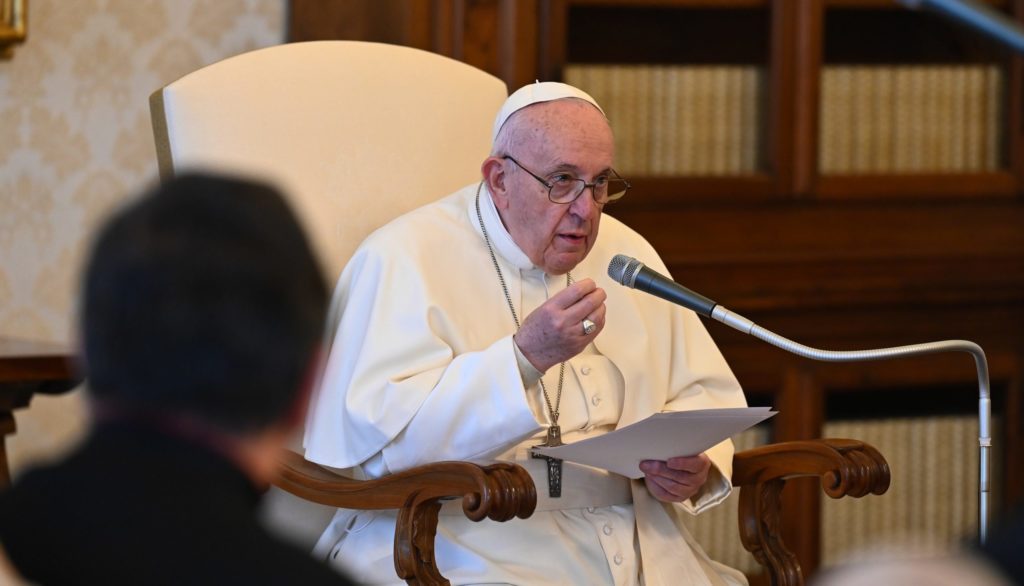Pope Francis began his catechesis by reflecting on the dialogical character of prayer: "Prayer is dialogue with God; and every creature, in a certain sense, 'dialogues' with God. In the human being, prayer becomes word, invocation, song, poetry... The divine Word has become flesh, and in the flesh of every man the word returns to God in prayer."
Words shape us
Through words we manifest our inner self. Therefore, Francis explains, "words are our creatures, but they are also our mothers, and in some way they shape us. The words of a prayer make us cross safely through a dark valley, direct us towards green meadows and rich in water, making us feast under the eyes of an enemy, as the psalm teaches us to recite (cfr Ps 23). Words hide feelings, but there is also the opposite way: words shape feelings. The Bible educates man so that everything comes out in the light of the word, so that nothing human is excluded, censured. Above all, pain is dangerous if it remains covered, closed within us..."
The words of a prayer lead us safely through a dark valley, towards green meadows and rich waters.
Pope Francis
For this reason Sacred Scripture teaches us to pray also with sometimes bold words: "The sacred writers do not want to deceive us about man: they know that in their hearts they also harbor unedifying sentiments, even hatred. None of us is born a saint, and when these bad feelings knock at the door of our heart we must be able to defuse them with prayer and with the words of God".
Also in the psalms we find very harsh expressions against the enemies: "expressions that the spiritual masters teach us to refer to the devil and to our sins, and they are also words that belong to human reality and that have ended up in the channel of the Holy Scriptures. They are there to testify to us that, if words did not exist in the face of violence, to make bad feelings harmless, to channel them so that they do not harm, the world would be completely sunk".
The first human prayer
The Pope assured that "the first human prayer is always a vocal recitation. First of all, the lips always move. Although, as we all know, praying does not mean repeating words, vocal prayer is the surest prayer and it is always possible to exercise it. Feelings, however, however noble, are always uncertain: they come and go, they leave us and return. Not only that, the graces of prayer are also unpredictable: at some point consolations abound, but on the darkest days they seem to evaporate altogether.
Vocal prayer is the safest and it is always possible to exercise it.
Pope Francis
"The prayer of the heart is mysterious and at certain times absent. The prayer of the lips, that which is whispered or recited in chorus, however, is always available, and is as necessary as manual labor. The Catechism states: "Vocal prayer is an indispensable element of the Christian life. The disciples, attracted by the silent prayer of their Master, are taught a vocal prayer: the "Our Father"."
Humility is fundamental for those who want to establish a relationship with God: "We should all have the humility of certain elderly people who, in church, perhaps because their hearing is no longer good, recite in a half-voice the prayers they learned as children, filling the aisle with whispers. Such prayer does not disturb the silence, but testifies to the fidelity to the duty of prayer, practiced throughout life, without ever failing. These praying people of humble prayer are often the great intercessors of parishes: they are the oaks that spread their branches every year, to give shade to the greatest number of people. God alone knows how much and when their hearts are united to these recited prayers: surely these people too have had to face nights and moments of emptiness. But one can always remain faithful to vocal prayer".
Vocal prayer awakens
Francis recalled the story of the Russian pilgrim: "We all have to learn from the constancy of that Russian pilgrim, of whom a famous work of spirituality speaks, who learned the art of prayer by repeating infinitely the same invocation: 'Jesus, Christ, Son of God, Lord, have mercy on us sinners'" (cf. CCC, 2616; 2667). If graces come into your life, if prayer one day becomes warm enough to perceive the presence of the Kingdom here in our midst, if your gaze is transformed to become like that of a child, it is because you have insisted on the recitation of a simple Christian ejaculatory. In the end, it becomes part of his breathing".
Vocal prayer awakens even the most dormant heart; it awakens feelings of which we had lost the memory.
Pope Francis
Finally, he concluded that "we must not, therefore, despise vocal prayer. The words we pronounce take us by the hand; at times they give us back a taste, they awaken even the most dormant heart; they awaken feelings of which we had lost the memory. And above all they are the only ones, in a sure way, that address to God the questions He wants to hear. Jesus has not left us in a fog. He said to us: "When you pray, say this way! And he taught us the Lord's Prayer (cf. Mt 6:9).









